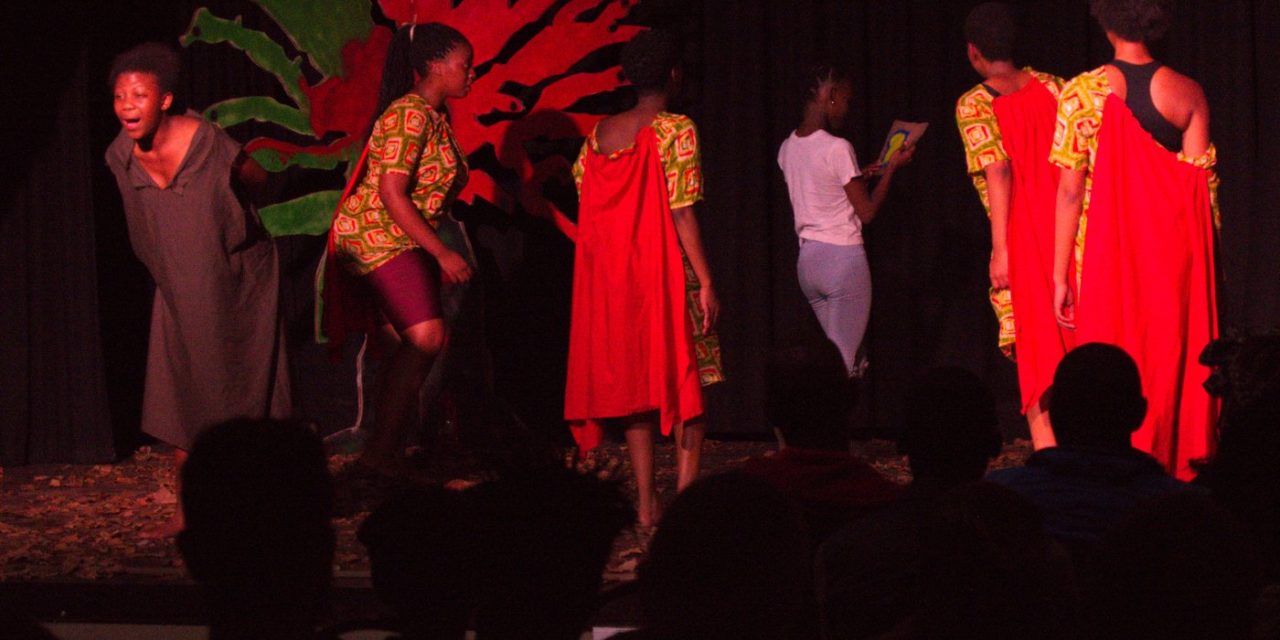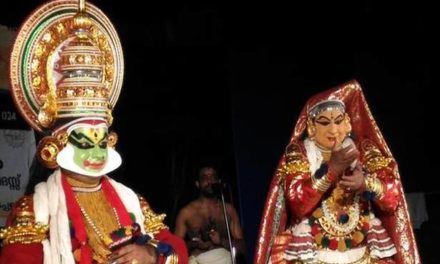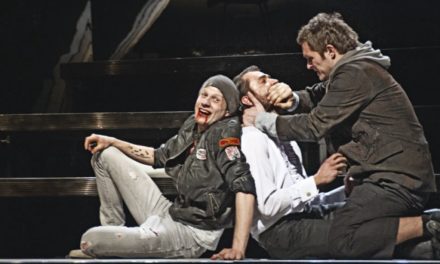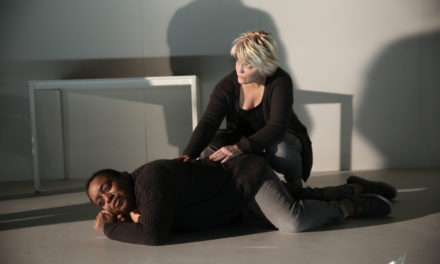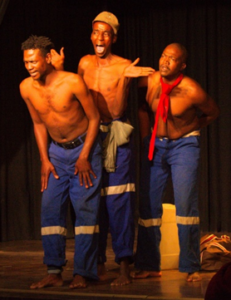
This Is My Story from Umhlanga Holdings. Director Bongi Mtsweni (Also the winner of the festival: Best Productions). Press photo
This year the South African National Community Theatre Association (SANCTA) held its 36th Annual One Act Play Community Festival and SATMag attended the event and was amazed at the efforts of these community theatre groups as they surely can compete on any professional stage! We also had a conversation with Noel McDonald on the history of community theatre in SA through the efforts of SANCTA.
SANCTA burst onto the mainstream of the SA theatre scene when the 2002 Naledi Awards recognised that SANCTA was bringing up the future talent of all races to the Professional theatre and therefore creating the Community Theatre category, which SANCTA ran for 5 years as there were no other major community theatre associations at the time. The first winner in 2002 was Roodepoort Hoer Skool with “The Cagebirds” which went on a tour to India to the Ryans’ Schools Annual Festivals and they were amazingly received. The last recipient of the Naledi for best community theatre production went to Gcebile Dlamini a member of the Hillbrow Theatre’s Outreach Foundation in 2015. This award allowed for community theatre in SA to be considered of great value and high-quality art; encouraging more professional theatre-makers, such as Gcebile Dlamini, to dive into the community and to create works that excel. Sadly the efforts of community groups are no longer acknowledged by the Naledies and have resulted in community groups taking their work to compete on the professional stage – outshining some of the established artists’ work.
It has been a great struggle over the last few years for both Community Theatre and Children’s Theatre as they were cancelled and then re – instated again within the Naledi Awards, explains the Chairman of SANCTA, Noel McDonald. Finally, in 2015, the award was cancelled to be relooked at in detail and depth as some of the community groups were semi-professional and new rules had to be put in place. A big theatre indaba was held by the Naledies via Dawn Lindbergh, chaired by Ismail Mohamed – at RAU. Here four main points were raised to be looked at for the 2016 awards- one being Community theatre which The Naledies agreed still had a place, but was becoming too varied and complex for the Naledis to judge. It was decided that Children’s Theatre would then be placed under Assitej SA for Yvette Hardie and a panel to judge and the same structure would have been put in place for community theatre which never realized as Ismail Mahomed was going to look at Community Theatre with interested parties in 2016. Mahomed moved to the Market theatre and this move made the SANCTA members happy as the matter could now be finalized. “Sadly he has resigned from the Naledi Board and thus it’s never likely to see the light of day again.” shares McDonald and states that being recognized by one’s professional peers was one of the most important highlights of the SANCTA Festival: “It is a sad loss to community theatre when you see the quality of work having been produced on final night.” SANCTA hopes that Mahomed would still contribute to the fest by giving an opportunity to members of the festival to showcase at the Market Theatre.
Despite the fact that there is no longer praise given to the excellence of community theatre, the SANCTA Festivals are still going from strength to strength and as in the past overcame all obstacles that came its way; the team will surely continue to soar with some of the finest work which has been and still is of great contribution to South African Theatre at large, as it has produced so many successful theatre patrons, one being the incredible Ismail Mohamed. Today the association runs two festivals; the Annual National SANCTA One – Act play Festival in Secunda, Mpumalanga and also the Full-length Play Festival. The 15 plays that were chosen to perform at the One Act play fest have two mentoring sessions each facilitated by well – known professional thespians spanning over a period of a month to assist the participants with progress on their plays: “This year we had Dorothy Anne Gould and Husband Michael Maxwell – both Patrons of Sancta- and Swannie Swanevelder also experienced in many theatre art forms, mainly puppetry.” The festival is adjudicated by highly qualified industry professionals: “This year we had Karin Van der Laag (Ex Isidingo actress), Quintin Wils and Vianney Henry Farmer, both well recognised up and coming directors, producers, writers and actors, with many nominations and awards country wide and Naledi Award Nominations.” SANCTA also runs various courses from playwriting to Poster competitions for children and in addition, for the past three years, SANCTA has been sending the winning play or a selection of playwrights to The National Arts Festival in Grahamstown to attend a 10-day Remix course. Last year, the University of Wits’ Drama for life organisation aided SANCTA in attending 20 plays which were all discussed the day after it showcased and it also included accommodation, food and transport totalling R50000.00 for 6 people.
SANCTA started life as a subdivision “Amfest” of the Amateur Association of the Performing Arts (AAPA) in 1980 and had as many as 80 members and was known as they covered many aspects of theatre this includes One- Act and Full-length plays, Dance, School Drama, and various theatre courses. “It was naturally a white based organisation and years passed and we entered the 90’s, many societies with now elderly members closed and we found the youth weren’t interested in theatre and up to about mid-2000’s that still was the case. Then came the new South Africa in 1994 which lessened audiences and members as a crime was bad at the time.”
Noel McDonald has been steering the competition as chair since 1999 and in the year 2000 McDonald changed the association’s name from SANATA (South African National Amateur Theatre Association) to SANCTA and along with this change came the determination of incorporating other race groups into SANCTA including communities from Soweto, Mamalodi, Hillbrow, KZN, North West, Duduza and Springs; “This grew as years passed to the extent that we are almost 90% black membership.” Many of the last remaining white groups weren’t in favour of this and left SANCTA, McDonald further explains; “so we have a handful of white members, but we going to make a determined effort to bring them back under SANCTA wings.” Incorporating new demographics, languages and multiple races all was in the aim of expanding the association’s appeal by registering it with The International Amateur Theatre Association- which has its head office in Finland; running a four yearly play festival in Monaco since 1952. It was started by Prince Rainier and Princess Grace (Kelly) and the Royal Family still sponsors it today (now sponsored by Prince Albert and Princess Charlene from Benoni). SANCTA have been invited a total of 5 times to attend the Festival du Mondial in Monaco; “So they recognise the value and high standards of our productions!” exclaims McDonald.
McDonald shares that their main objective now is to bring theatre to life in other Provinces and also to use theatre as a tool for social change and get audiences to attend theatrical performances especially in Mpumalanga. Furthermore, they wish to reach mainly the youth from the different provinces, even in communities of Johannesburg including Alexandra, Tembisa, and Soweto, to give them the opportunity to bring their plays – self-written or workshopped- to light on a proper theatre stage. “Our other aim is to be socially responsible and bring to and use the arts by all races to practice or as an audience to foster cultural harmony, as emphasised by President Mbeki in his term of office and the current Minister of Arts.” tells the SANCTA chair, McDonald. SANCTA is also looking at hopefully bringing a festival back to Gauteng if funding allows for it to realize. “Sancta itself is a tightly run ship and NGO’s are almost never funded, so we are almost entirely dependent on Grants and donations for our festivals and other programmes.” With a very strict recent Budget Speech, and with the country’s finances not being in good shape the Arts are once again bound to suffer from The Government. McDonald notes that even professionals will be cutting back on overseas productions with costs of rights in dollars and pounds and many new and young especially professional companies will battle to produce shows. But in the same breath Noel offers hope to theatre companies by advising that theatre companies should apply for financial support from foreign countries as they have been actively donating since 2000 to the South Africa Arts sector; eg: The Royal Netherlands, Sida from Sweden, Goethe Institute and Lutheran Church from Germany and these are some of the companies the association relies on for financial support. Locally Theatre Houses may apply for funding from The Lottery, Arts and Culture Trust (ACT), Business and Arts SA (BASA), and The National Arts Council and Provincial Departments of Arts and Culture. But still applying to the government or private sectors does not always guaranteed that funding will be made available – it is also extremely difficult for new theatre groups to obtain financial support as the more established theatre houses are served first and finances for the arts are worsened by the fact that there doesn’t exist enough bodies that put the arts first and this is mostly to blame on the South African government. “Since 1994 we have had different Ministers of Arts and Culture, Sport and Recreation with different agendas. Some favouring the arts, others Heritage, but almost all Sports as that is a huge money spinner locally and abroad and generally funding for the Theatre and Arts is negligible in ratio.” McDonald goes on to say that this resulted in arts now being at the bottom of the ranking. The private sector that use to pump money into theatre houses have since 2008 depression been drastically reduced; “especially last year with Brexit, the new Brics, a new American President, all Government funding has been tightened especially in the Arts.” Noel adds on.
Yet there is a great success with black theatre thriving in rural areas in poorer Provinces notes Noel “Yes, fortunately, some Government and private funders are concentrating on those Provinces, like we are.” Noel continues to explain that SANCTA is a Gauteng based National organisation, but stemmed off into communities where there’s a need for theatre seeing that the main towns in the country are being neglected. “Some countries all over the world classify the arts highly, equally to sport and theatre thrives in Europe, China/ Japan, USA and South America.” So when will South Africa give credit where it’s due? It is not enough to invest in the future of theatre while the theatre of the now struggles to survive.
This article was first published in the March 2017 edition of SATMag. Reposted with permission.
This post was written by the author in their personal capacity.The opinions expressed in this article are the author’s own and do not reflect the view of The Theatre Times, their staff or collaborators.
This post was written by Vianney Henry Farmer.
The views expressed here belong to the author and do not necessarily reflect our views and opinions.

